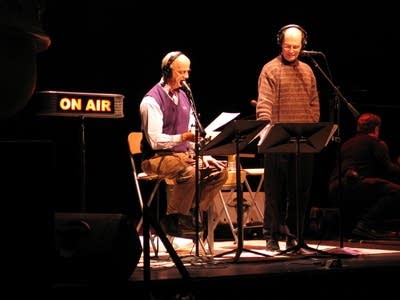Tom Keith, a showman but not a showoff
Go Deeper.
Create an account or log in to save stories.
Like this?
Thanks for liking this story! We have added it to a list of your favorite stories.

Dale Connelly, formerly of Minnesota Public Radio, is news director at KFAI Radio in Minneapolis. He blogs at daleconnelly.com.
St. Paul, Minn. — It is strange to sit here thinking about my dear friend Tom Keith on Halloween night.
Tom was a nimble radio sound effects artist who could, in an instant, summon the mad scientist from his lab and release the vampire from his coffin. He could do the werewolf howl and knew how to chortle like a maniac who has found a loose block in the wall of his dungeon. All the standard sounds of this cartoonish observance were in Tom's wheelhouse, as they say, so you might expect him to embrace the day like Fezziwig loved Christmas. But Tom Keith was not a big fan of Halloween. A welcome and invited radio guest in thousands of homes, he frowned on the idea of strange people just showing up at the door.
On Halloween night Tom became your crabby neighbor who would turn out the lights and go sit in the back room until the bell stopped ringing. This curmudgeonly attitude coming from someone known for his sense of fun was unexpected, and he knew it. In fact, if you asked him to portray a crabby neighbor who would turn out the lights and go sit in the back room until the bell stopped ringing, he could do it with nothing more than a raised eyebrow, a shift in weight, a suspicious grunt, and it would be so perfectly on target that your stomach would ache from laughing. Tom Keith saw many things with an unusual clarity. He did not take himself seriously, and he didn't take you too seriously, either.
Turn Up Your Support
MPR News helps you turn down the noise and build shared understanding. Turn up your support for this public resource and keep trusted journalism accessible to all.
Like a lot of people, I first heard Tom as Garrison Keillor's sidekick on MPR's "Prairie Home Morning Show." He was Ed Jim Poole, a trainer of attack chickens. The name was later reshuffled to be Jim Ed Poole, though there was no real change in character. He gave us a sophisticated bumpkin and a dry wit comedian who appeared to say hilarious things by mistake. Or was it intentional? One could never be sure, and that mystery was an enduring part of the attraction. I worked side by side with Tom in a succession of small glass-walled rooms for five mornings a week over the course of more than 25 years, and I'm still wondering how funny he meant to be. Every broadcast was an expedition into unknown territories.
I wrote a pile of scripts for him. Many ideas were inspired by something I thought he could do, and he never let me down. Whatever I gave him got better with his contribution. The humor came in small moments -- the timing of a single word or a slight change in inflection. It came in large helpings with the sudden inexplicable arrival of a fleet of one-bladed helicopters and the falsely brave yell of a man changing his mind as he is about to go over the falls in a barrel. Tom's genius lay in the ability to render a complete realization of impossible illusions. Though he spent most of his adult life in radio, Tom Keith was, at heart, an illustrator.
He was also a softie, and a servant, always aware that his livelihood depended on an audience willing to pay the freight. Quite naturally he channeled his inner ex-Marine when he developed our Morning Show playlist guidelines, declaring that all listener requests must be turned in no later than 5 days before the date of broadcast. No exceptions. And with equal ease he tossed those regulations aside whenever anyone asked. If you were a grandmother needing to hear a specific song for your grandson's birthday sometime in the next half hour before the kid's bus came, Tom Keith was your man. The harsh rules he had written could not stand up to anyone's polite request.
Tom was not a prima donna or a showoff, which was ironic given that he had such showy talents. His name was known to millions as one of the last surviving radio sound men, but he was not terribly interested in increasing his profile. He said no to television projects with Hollywood stars, and decided to stop touring with Prairie Home Companion when he got tired of the road. He would turn down a commercial voice job because Schniederman's was delivering a couch that afternoon, and he had to be at home to meet the truck. Above all, he was a man of his word and he always did his job, which was to make the work in front of him as good as it could be. He was frugal, sensible, practical, and oh so Minnesotan.
Respect outward. Humor inward. Integrity always.
Cheers, Buddy. And bon voyage.
Dear reader,
Political debates with family or friends can get heated. But what if there was a way to handle them better?
You can learn how to have civil political conversations with our new e-book!
Download our free e-book, Talking Sense: Have Hard Political Conversations, Better, and learn how to talk without the tension.




